Sports Medicine
1/48
Earn XP
Description and Tags
Semester 2 Final Study Guide
Name | Mastery | Learn | Test | Matching | Spaced |
|---|
No study sessions yet.
49 Terms
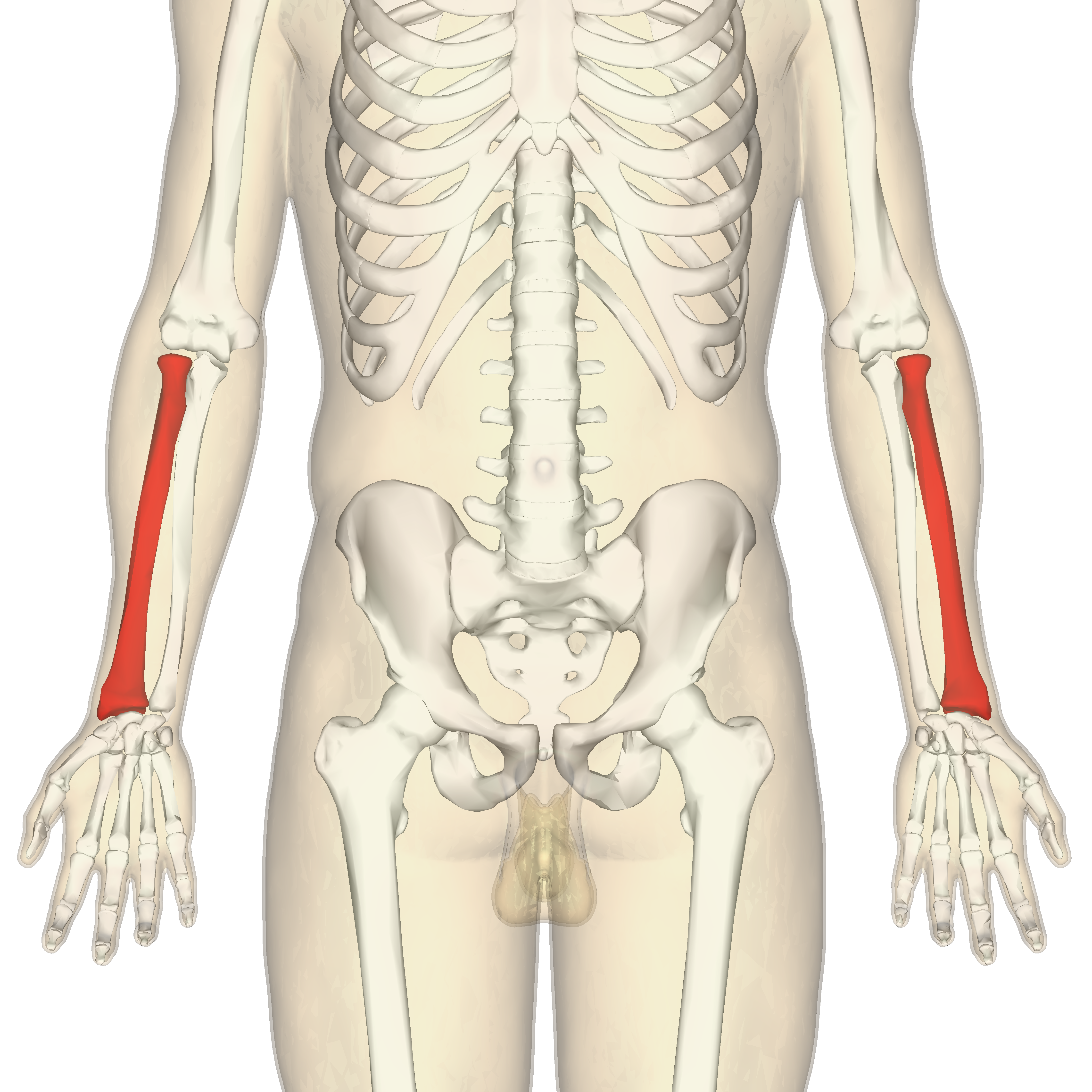
Which bone is colored red in the image below?
Radius
Early defibrillation is a link in the Adult Chain of Survival. Why is it important to survival?
It eliminates the abnormal heart rhythm.
The sternum is ___ to the spine
anterior
While performing high quality CPR on an adult, what action should you ensure is being accomplished?
Allowing the chest to recoil to the full starting position.
what is tissue perfusion?
the passage of blood through the circulatory system to organs and other body tissue.
Which statement is correct?
a. The hip is proximal to the knee
b. The knee is distal to the ankle
c. The shoulder is distal to the elbow
d. The knee is proximal to the hip
a) The hip is proximal to the knee.
Adduction of the shoulder, hip and fingers are all motions that occur parallel to which plane of the body?
Frontal plane
Match the method of transmission with the correct example
1. Touching a doorknob that has mucus on it
→ Indirect Contact
2. Walking into a room where a sick person has sneezed or coughed without wearing PPE
→ Airborne Transmission
3. Taking a hike, then later finding a tick latched on to your ankle sucking your blood
→ Vector-Borne Transmission
4. Sharing a New Year's Eve kiss with a random person at a party
→ Direct Contact
When should rescuers switch positions during CPR?
About every 2 minutes
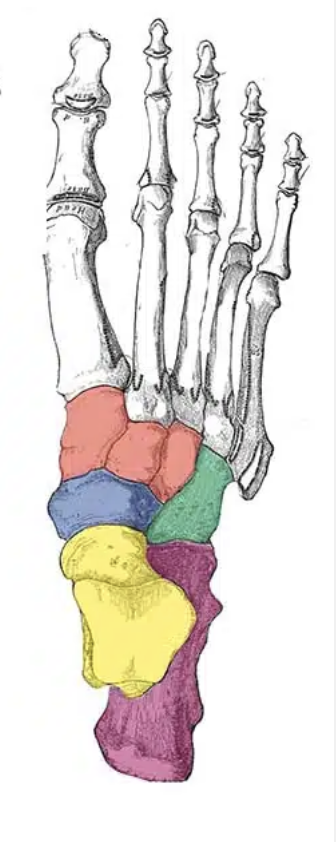
Match the name of the bones with the correct color tarsal bone (shown in the image below)
1. Green bone → Cuboid
2. Purple bone → Calcaneus
3. Yellow bone → Talus
4. Blue bone → Navicular
5. Pink bone → Cuneiforms
Pronation and supination are pivot movements that occur at which joints/bones?
Radias and Ulna
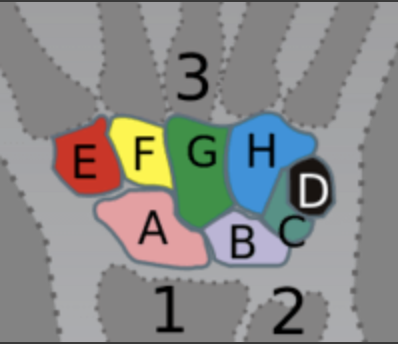
Match the labeled carpal bones with the correct name. The bone labeled #1 is the Radius on the Thumb side and the bone labeled #2 is the Ulna on the Pinkie side
Labeled A → Scaphoid
Labeled B → Lunate
Labeled C → Triquetrum
Labeled D → Pisiform
Labeled E → Trapezium
Labeled F → Trapezoid
Labeled G → Capitate
Labeled H → Hamate
When ATP is produced without the presence of oxygen, this is known as
anaerobic respiration
How many vertebrae are located in the thoracic region of the spine?
12
The wrist is ___ to the elbow
distal
The medical term for low blood pressure is what?
Hypotension
Organize the stages of shock
1) Initial stage
2) Compensatory stage
3) Progressive stage
4) Refractory stage
The eyes are ___ to the ears
medial
The belly button is ___ to the neck
inferior
How do you check a person's airway?
head tilt-chin lift
RO.S.C. stands for Return of Simple Circulation
False - Return of Spontaneous Circulation
Which joint is an example of a ball-and-socket joint?
Shoulder
Noah is very short. He needs to stand on his "tip toe's" to reach the cookie jar on the top shelf of the cupboard. What is the movement of his ankles?
plantarflexion
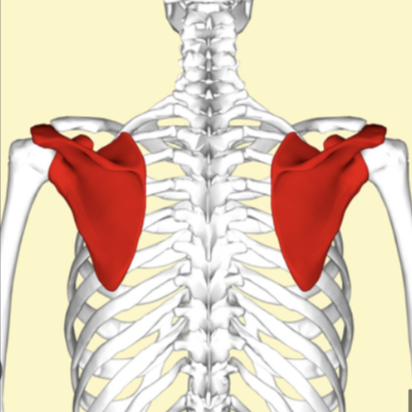
Which bone is colored red in the image below?
Scapula
Flexion and Extension are motions that occur parallel to which plane of the body?
Sagittal Plane
Which type of cartilage is a precursor to bone?
Hyaline cartilage
Which structure holds bones to bones?
Ligaments

Correctly label the regions of the spine.
A. Cervical
B. Thoracic
C. Lumbar
D. Sacrum
What is the correct order of steps an employee must take if they have been exposed or come in contact with bodily fluid contaminated with a bloodborne pathogen?
1) Immediately decontaminate
2) Report the exposure
3) Seek medical treatment
4) Isolate themselves

What is the the name of the bone outlined in red?
Calcaneus
Which type of cartilage is found in the external ear?
Elastic cartilage
Which adult victim requires high-quality CPR?
Has no normal breathing and no pulse
The chin is ___ to the nose
Inferior
How many vertebrae are there in the lumbar region of the spine?
5
Match the term with its correct description
Anterior — Closer to the front of the body
Distal — Farther from the trunk
Deep — Inside or farther from the surface of the body
Inferior — Closer to the feet
Superior — Closer to the head
Lateral — Farther from the median plane or towards the outside
Posterior — Closer to the back of the body
Proximal — Closer to the trunk
Superficial — Closer to the surface of the body
What is the correct order of the Adult Chain of Survival?
1) Immediate Recognition
2) High Quality CPR
3) Early Defibrillation
4) Advanced Life Support
5) Post Cardiac Arrest Care
6) Recovery
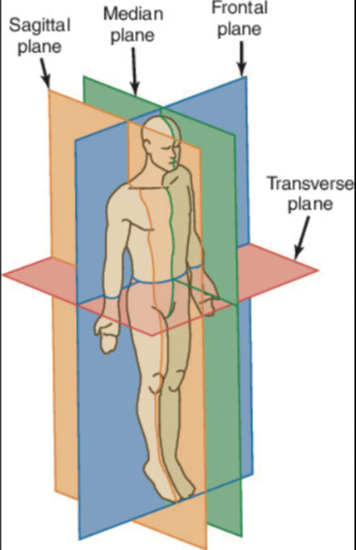
Label the planes of the body shown below.
(Blank 1=A)
A. Sagittal plane
B. Frontal plane
C. Transverse plane
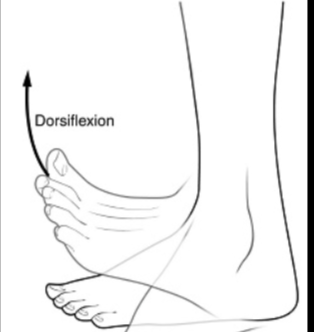
Which movement is shown in the picture?
Dorsiflexion
Using _____ resolves the uncertainty of being exposed to bloodborne pathogens. The actions require you to treat all human blood and bodily fluids as if they were known to be Infected with HIV, HBV, or other bloodborne pathogens.
Standard Precautions
Match the type of shock with it's correct cause.
1. Severe allergic reaction — Anaphylactic shock
2. Bacterial infection — Septic shock
3. Heart malfunction/disease — Cardiogenic shock
4. Severe loss of blood — Hypovolemic shock
5. Blockage of blood — Obstructive shock
6. Spinal cord or brain damage — Neurogenic shock
Direct transmission is when you touch a contaminated object or surface then transfer the infected material into your mouth, eyes, nose, or open skin.
False - When you touch, kiss, have sexual contact, or contact with blood or bodily fluids
Organize the steps of providing CPR to an Unresponsive person.
1. Assess scene safety.
2. Check for responsiveness.
3. Perform Look, Listen, Feel. (to check for breathing)
4. Check for breathing.
5. Check for circulation.
6. Perform the head-tilt, chin-lift.
7. Check for airway.
8. Assess carotid pulse.
9. Begin CPR.
Match the Bloodborne Pathogen with the correct details.
1. Primarily affects the liver — Hepatitis B
2. May live on surfaces for days to weeks — Hepatitis B
3. You may have no symptoms at all and be unaware that you are infected — Both
4. Contributes to the development of cirrhosis — Hepatitis B
5. Leads to a worse disease called AIDS — HIV
6. May develop into cancer or cirrhosis — Hepatitis B
7. Transmitted primarily through sexual contact — HIV
8. Primarily affects the immune system — HIV
9. Does not survive well on surfaces or outside the body — HIV
10. May cause flu-like symptoms — Both
Muscle is ___ to the skin
deep
Which statement is correct?
a. The elbow is distal to the shoulder
b. The chin is anterior to the nose
c. The elbow is proximal to the shoulder
d.The ear is medial to the eye
a) The elbow is distal to the shoulder
Which of the following is NOT one of the 5 functions of the skeletal system?
Movement
Blood Production
Storage of minerals
Strength
Protection
Support
Strength is not part of the 5 main functions
The 5 main functions of the skeletal system are:
Support
Movement (with muscles)
Protection (of organs)
Blood production (in bone marrow)
Storage of minerals (like calcium and phosphorus)
The heart and lungs are _ to the ribs
deep
Match the joint action with the correct description.
1. Abduction — a. Movement away from the midline of the body
2. Adduction — b. Movement towards the midline of the body
3. Circumduction — c. A combination movement of flexion, extension, adduction, and abduction
4. Extension — f. An increase in the angle between the two bones of the joint
5. External rotation — e. Rotation away from the midline of the body
6. Flexion — c. A decrease in the angle between the two bones of the joint
7. Internal rotation — d. Rotation toward the midline of the body
8. Pronation — g. Palm is moved to face posteriorly
9. Supination — h. Palm is moved to face anteriorly
PRACTICE LABELING THE SKELETON